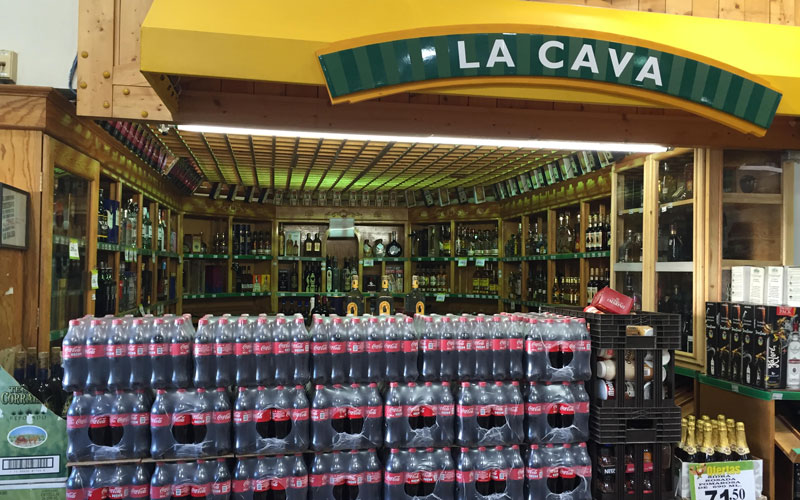
The alcohol cellar for a Superette grocery store in Ciudad Juárez is blocked with cola bottles and crates around 5 p.m. on Feb. 16, 2016. The entire city is enforcing a ban on alcohol sales during Pope Francis’ visit until 10 a.m. on Feb. 18. (Photo by Miguel Otárola/Cronkite News)
CIUDAD JUÁREZ, Mexico — Not everyone in Ciudad Juárez may be Catholic, but for the next few hours, everyone will have to make some peculiar accommodations.
Read more:
Phoenix couple rejoices at opportunity to see Papal Mass in Mexico
Storify: Social media coverage of Pope Francis’ Mass on the border
Police and military prevalent day before Francis’ visit to Ciudad Juarez
El Paso remains quiet in days leading up to papal Mass across border
As Pope nears Ciudad Juárez, workers race to finish Mass stage
Pope Francis’ visit to border is strategic, both for Latinos and the Vatican
Indeed, at La Juárez seafood restaurant in a renovated three-story structure, the waiter on Tuesday interrupts lunch at 2:40 p.m. with news that could be saddening to some. He reminds that “last call” on alcohol starts at 3 p.m. and no alcohol sales will be allowed through Wednesday.
“This is for the entire city,” he says to our table.
This temporary “ley seca,” or “dry law”, could be unique to Mexico. It was in effect near Ecatepec as Pope Francis visited the region on Sunday. Other signs were seen around Ciudad Juárez earlier in the week, saying sales will be banned until 10 a.m. Thursday.
Mexico is no stranger to dry laws. Many of the country’s states ban alcohol sales for 24 hours before regular elections and throughout election day.
Nothing of the sort was apparent during Francis’ visit to the United States last year. On the contrary, six different “pope brews” were introduced when the pope came to Philadelphia in September (among them, Cape May Brewing’s YOPO — You Only Pope Once).
Francis is expected to land in Juárez from Mexico City on Wednesday at 10 a.m. His first stop will be at a local prison, followed by a meeting with factory workers at a school. His final route stop is near the U.S.-Mexico border, where he will celebrate Mass to more than 220,000 people before returning to Rome.
But here emerges a benefit of living on the border. When things get complicated on one side, you simply look to the other side for answers. On Tuesday night, thirsty people — among them some of the 1,500 reporters who descended in Ciudad Juárez this week — made a beeline for bars in El Paso.